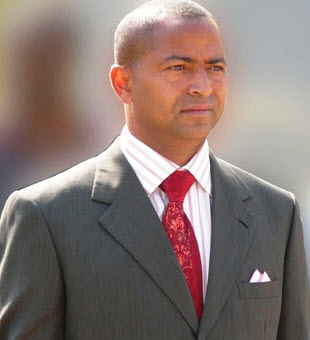
On Friday, the TP Mazembe chairman narrowly escaped an attack by “fighters” in Brussels, Belgium. Mr. Katumbi was having lunch at the Hilton Brussels City hotel when three Congolese entered the lobby looking for him. Once they located him in the restaurant, they screamed their rallying cry, “Ingeta”. They were then joined by other “fighters” who had remained outside the hotel. The group of about ten people then launched towards the governor.
An intense battle ensued between the “fighters” and Mr. Katumbi’s bodyguards, who opposed a fierce resistance. The “fighters” were forced to withdraw but managed to flee the scene before the police, called by the hotel’s staff, arrived.
“By going to Europe, Governor Katumbi had prepared himself accordingly as most Congolese authorities who have travelled to Europe have been victims of attacks by these ‘fighters’. That's why he brought all his bodyguards with him,” his adviser, Salomon Idi, said recounting the attempted assault. He added that Governor Katumbi is safe and continues his visit in Belgium.
Last December, the President of the Congolese Senate did not fare so well after being assaulted by “fighters” on New Year's Eve. Leon Kengo wa Dondo was attacked at the Gare du Nord railway station in Paris as he prepared to board a car that came to pick him. Mr. Kengo was kicked, causing him to lose some teeth, and had to be hospitalized.
The attack caused an outcry in the Congolese political class. Opposition leader Etienne Tshisekedi’s party, the UDPS, condemned the “henious” attack of Mr. Kengo and denied any involvement. The “fighters”, who have set up websites to organize and are very active in social media, were delighted. They reproached Mr. Kengo, an opposition candidate in the Nov. 28 presidential election, of having attended President Joseph Kabila’s inauguration on December 20.
The French Ambassador to the Democratic Republic of Congo, Luc Hallade, was summoned by Congolese Foreign Minister Alexis Thambwe Mwamba. “We consider that France has an obligation to ensure the safety of Congolese officials visiting Paris, the safety of our representatives and our diplomatic mission,” Mr. Mwamba said, demanding an investigation.
Ambassador Hallade said then that “It is better in the current context that Congolese officials who are known to be travelling, even in private, inform us in advance so that we can make arrangements for their security.”
On Monday, the Belgian Ambassador to the Democratic Republic of Congo, Dominique Struye de Swielande, condemned the attempted assault on Governor Katumbi. The Belgian diplomat also stressed the need for Congolese officials to officially inform his country of visits by Congolese authorities to ensure their safety.
“It is up to the Belgian Government to protect Congolese authorities visiting Belgium, provided that the Belgian authorities are notified in time,” Ambassador Struye told Radio Okapi. He announced that charges have already been filed against the “fighters” who tried to attack Governor Katumbi. “They can either lead to convictions or expulsions,” he said.
Europe is not the only continent where the “fighters” are active. The title has almost become synonymous with Congolese in the diaspora, or at home, strongly opposed to President Kabila. South Africa has deported “fighters” who were living illegally in the country after they were involved in an attack on the Congolese embassy. In the lead-up to the Nov. 28 elections, the chairman of the electoral commission, Daniel Ngoy Mulunda, was attacked by “fighters” while visiting South Africa.
On the web: Congo News Agency | From Radio Okapi article
Related articles
- • European Union Suspends Defence Consultations with Rwanda (February 24, 2025)
- • UN Security Council Calls on Rwanda to Stop Supporting M23 Rebels in DR Congo (February 22, 2025)
- • DR Congo Citizens Head to Polls to Elect President, Members of Parliament (December 20, 2023)
- • Felix Tshisekedi Sworn In as DR Congo President (January 24, 2019)
- • Constitutional Court Declares Tshisekedi Winner of Presidential Election (January 19, 2019)
- • Martin Fayulu Challenges Presidential Election Results in Court (January 12, 2019)
- • Felix Tshisekedi Vows to Be the President of All Congolese (January 10, 2019)
- • Martin Fayulu Rejects Presidential Election Results (January 10, 2019)
- • Felix Tshisekedi Elected DR Congo President (January 10, 2019)
- • DR Congo Delays Results of December Election (January 6, 2019)
- • Bemba, Katumbi renew their support for joint opposition presidential candidate Fayulu (November 16, 2018)
- • Vital Kamerhe also withdraws support for joint opposition presidential bid (November 12, 2018)
- • Felix Tshisekedi withdraws support for joint opposition presidential bid (November 12, 2018)
- • Oppositioin leaders pick Martin Fayulu as joint presidential candidate (November 11, 2018)
- • Jean-Pierre Bemba banned from running for president (August 25, 2018)
- • Vital Kamerhe named UNC presidential candidate (August 4, 2018)
- • Bemba says Katumbi should be allowed to run for president (August 4, 2018)
- • Moise Katumbi blocked from entering DR Congo (August 3, 2018)
- • Jean-Pierre Bemba Returns to DR Congo (August 1, 2018)
- • Jean-Pierre Bemba named MLC presidential candidate (July 13, 2018)
- • V Club Crowned Congo Champions (July 12, 2018)
- • Mazembe drawn against Difaa El Jadidi, ES Setif in Champions League (March 21, 2018)
- • At least 30 dead after massacres in Ituri (March 2, 2018)
- • Botswana Urges Joseph Kabila to Step Down (February 26, 2018)
- • No elections in DR Congo in December without electronic voting machines: INEC (February 13, 2018)
- • US Warns DR Congo Against Electronic Voting for Delayed Election (February 12, 2018)
- • Presidential election scheduled for December 23, 2018 (November 5, 2017)
- • Felix Tshisekedi accuses INEC of illegally prolonging Kabila's mandate (October 24, 2017)
- • DRC Seeks Arrest of Presidential Candidate Moise Katumbi (May 19, 2016)
- • Papa Wemba Is Buried in Kinshasa (May 4, 2016)







